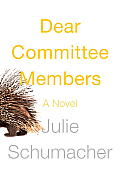
Saint Paul, August 2014
Dear Professor Fitger,
I've been asked to say a few words about you for Powells.com. Having dreamed you up with a ball-point pen in a composition notebook (drafting on the right-hand page, and making edits and corrections on the left [see figure 1]), I should be well equipped to describe you, to report on your character, your temperament and foibles, and your relationship — if any — to me.
But: Am I nervous? Do you make me nervous? You're not the sort of person with whom I feel at ease, and I would hesitate — though I invented you — to invite you home for a meal. I suspect you're smarter than I am (you would certainly assume that to be the case), and your intellect is aggressive. You're unpredictable, even to me, and I find the shifts in your temper unsettling.
I'll begin with some background: I'm not one of those writers who claims to take dictation from a Muse as if participating in a literary séance, but you did arrive in my imagination almost fully formed. Though I usually refer to my characters-in-process via initials at first — until they establish themselves and I get to know them — you showed up on the page as Jay Fitzger, then Fitger (I dropped a Z somewhere), confident and mouthy from the start.
Figure 1
Did I immediately love you? Identify with you? Clandestinely, and from a distance, yes. Though you are male and divorced and prone to outbursts and I am not, we have several important things in common. We are both Midwesterners and professor-writers. We have both survived the reconstruction of academic office buildings that were refurbished for departments not our own [see figure 2].
Figure 2
And we share a nostalgia for letter-writing — such a lovely anachronistic art form, slower, more intimate, and more self-revealing than email. Letters are sensual, if not outright seductive. We both find it impossible to resist the wonderfully tactile paraphernalia of the handwritten letter: pen and paper, envelope, stamp, mailbox, letter opener — yes, I own one, along with a metal embosser [see figure 3] — and the delay that magnifies the pleasure of correspondence. I've never been a smoker but have often admired from an abstemious distance the cigarette's accouterments: the rolling papers, the tap-tap-tap of the pack against the back of the hand, the yellow romantic glow of the match...
Figure 3
More to the point, Professor F, you and I share the dispiriting impression that our historical moment is past, that many of the best-loved trappings of our lives are quaint if not dead, turned to dusty bric-a-brac that techno-travelers wearing Google glasses can briefly glimpse, while rushing along to their glittering now.
When I typed up the first draft of Dear Committee Members and showed it to my spouse, he laughed out loud, then scratched his head and looked anxious. "Okay, it's funny," he said. "But it's also painful. Are you really that angry?" Angry, moi? "No," I said. "Jay Fitger is angry" [see figure 4]. I pointed my finger conveniently at you.
Figure 4
Here's a little digression. While I was working on Dear Committee Members, compiling the letters of recommendation you would fire off during the course of an academic year, Claire Messud published The Woman Upstairs, which begins with a sentence that sent me directly to the checkout counter, money in hand: "How angry am I?" I so wished I had written that four-word sentence. But never mind. Messud's protagonist, Nora, says,
I'm a good girl, I'm a nice girl, I'm a straight-A, straight-laced, good daughter, good career girl, and I never stole anybody's boyfriend and I never ran out on a girlfriend, and I put up with my parents' shit and my brother's shit, and I'm not a girl anyhow, I'm over forty fucking years old... and what I really want to shout, and want in big letters on [my] grave, too, is FUCK YOU ALL.
The price of the hardcover was more than worth that cathartic first page.
It was intriguing to learn — via an interview in New York Magazine — that Messud has been described by friends as "almost too well-behaved." I wonder if her rageful character, Nora, is named for Ibsen's (see figure 5). I wonder whether creating Nora's voice was difficult for Messud, or whether it streamed quickly, almost disturbingly so, onto the page.
Figure 5
Dear Jay, if you're still reading, you can probably see where this letter is going. I know I'll be a disappointment to you. I'm a conciliator by nature, with a permanent address on the mild-mannered end of the spectrum. You're egotistical and heedless: but as you emerged through the tip of my pen, I understood that you were passionate, too. You're more vivid than I am. For years before I set you to paper, you must have been hovering just under my skin, a shadow-self, the chief protagonist in my alternate life.
We love the same things, but I think we're too different. So this is a love letter, and it's also a letter in which I tell you that we're breaking up. Thank you for being who I am not.
Yours truly,
Julie Schumacher